Jeffrey Blackshear
Forrest Blue
Sam Boghosian
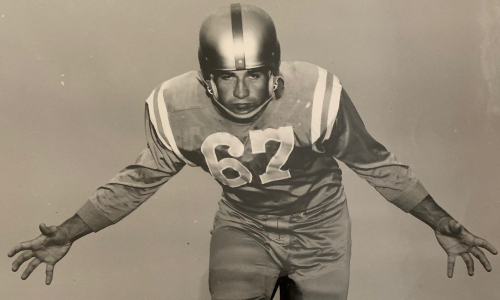
“Where’s Sam’s book?” was a common refrain in the Boghosian household.
Sam Boghosian kept a detailed notebook about every single day in his life. The notebook was stuffed with business cards from everyone he met. If a question arose, the notebook had the answers.
His tedious notetaking started when he was young. His daughter, Jody Schiltz, even found a notebook from when he played on the offensive line for the 1954 UCLA National Championship team. He drew each play out and meticulously listed his responsibilities to accompany each diagram.
But flash to 2015, and Jody had to intervene to help her dad file his taxes. The following year, he forgot to ask for help on them. By 2018, his family had to take the mail away from him because otherwise it would never get read.
“He’d be abhorred with this person,” Schiltz told her mom. “This is not who he is.”
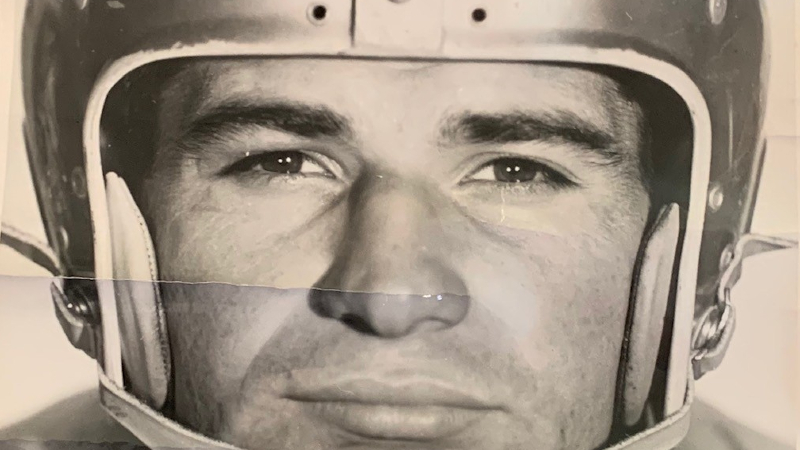
The Boghosian family fled from Turkey during the Armenian Genocide in the early 20th century. The family settled in Fresno, California and made a living as farmers.
Sam was born on December 22, 1931. His family was a magnet for tragedy. In a 14-month span, when Boghosian was just 11 years old, he and two of his siblings contracted polio. The polio killed one of his sisters, his older brother went missing in action as a jet fighter in World War II, Boghosian’s father died, and then his family farm burned to the ground.
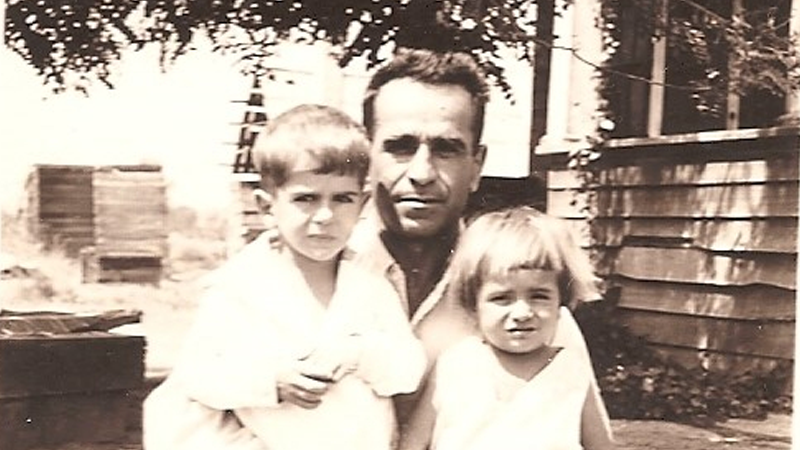
His polio led doctors to believe Boghosian would never walk again. One of his calf muscles had severe atrophy and he had to wear a lift in one of his shoes, but Boghosian defied the odds and taught himself to walk again at a young age. He compensated well enough for his disease to become a very good athlete. At just 5’10,” he starred on his high school football team and earned a scholarship to play offensive and defensive guard for UCLA.
Before enrolling on campus, head coach Red Sanders sent Boghosian a letter warning him about being out of shape. Boghosian embraced hard coaching then and throughout his life. Schiltz believes his coaches filled a void in his life.
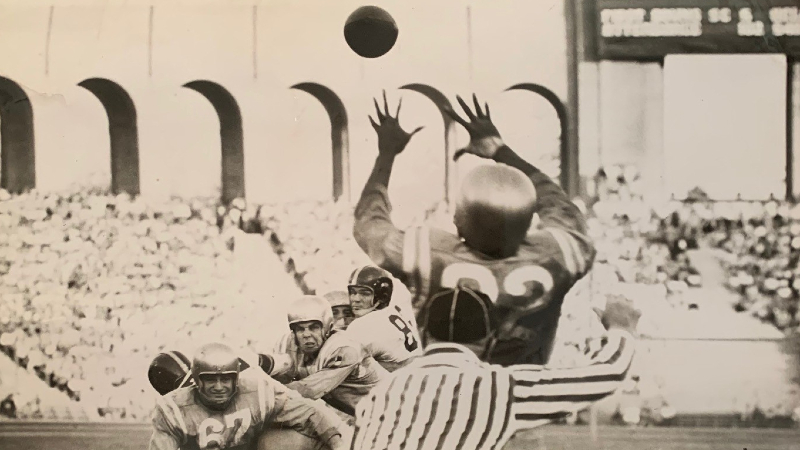
“He didn’t have a father figure,” Schiltz said. “But he had these people in his coaching career that he emulated and strived to be like.”
After finishing at UCLA, Boghosian was drafted by the San Francisco 49ers but turned down professional football for the more lucrative option of joining Sanders’ staff as an assistant. It was the start of his 30-year coaching career.
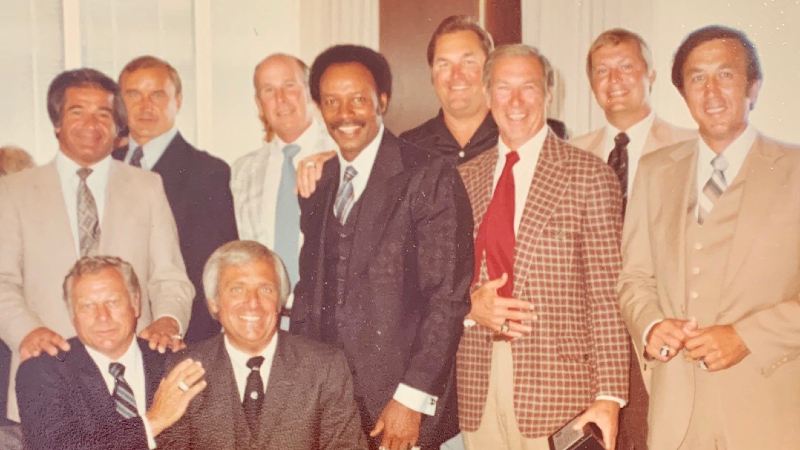
Sam Boghosian, far left, with the rest of the Oakland Raiders coaching staff in 1982 when they received their Super Bowl Championship rings from the prior season.
After UCLA, Boghosian held various coaching jobs at Oregon State University and then in pro football with the Houston Oilers, Seattle Seahawks, and the Oakland and Los Angeles Raiders.
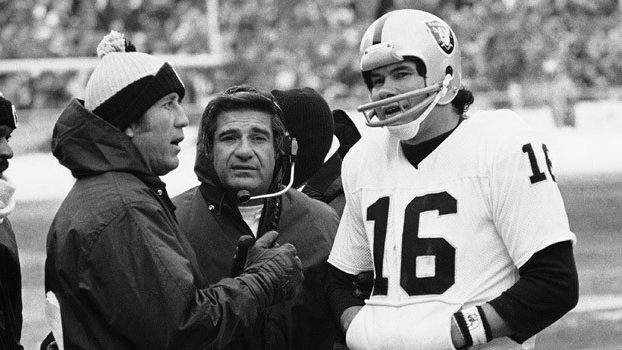
His players called Boghosian “The Whip” because he held an impossibly high standard. He kept a sign on his desk that said, “WINNING SOLVES ALL PROBLEMS.” He won two Super Bowl rings with the Raiders in 1981 and 1984 under head coach Tom Flores.
“He just didn’t accept failure,” Schiltz said.
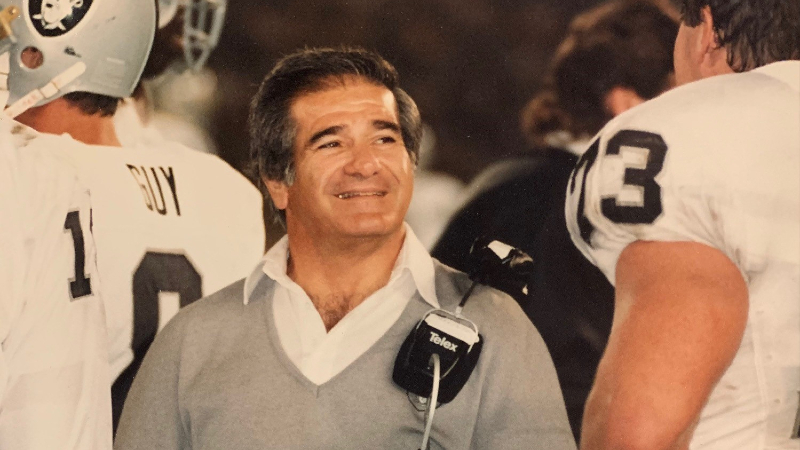
Bogohsian was a harsh coach but a loving friend and father who did anything for those close to him. Coaching created distance between Boghosian and Schiltz, his only daughter. He cried any time he had to part from her.
Family meant everything to Boghosian. He had a deep love for his surviving siblings and adored his many nieces and nephews.
“He was the gatekeeper for the whole family,” Schiltz said.
In 1961, the Bel Air Fire wrecked the community surrounding UCLA. Schiltz tells the story of how Boghosian knew his friend’s home was in peril so he rented a water pump. Boghosian pumped the home’s pool and used the water to put out the fire. He asked for nothing in return.
Boghosian and his wife Judy moved to Indian Wells, California before the turn of the century. There, Boghosian’s generosity manifested in countless charity golf tournaments. He was especially active in the Triple X Fraternity, an organization rooted in expanding the rights of access of young Armenian Americans.
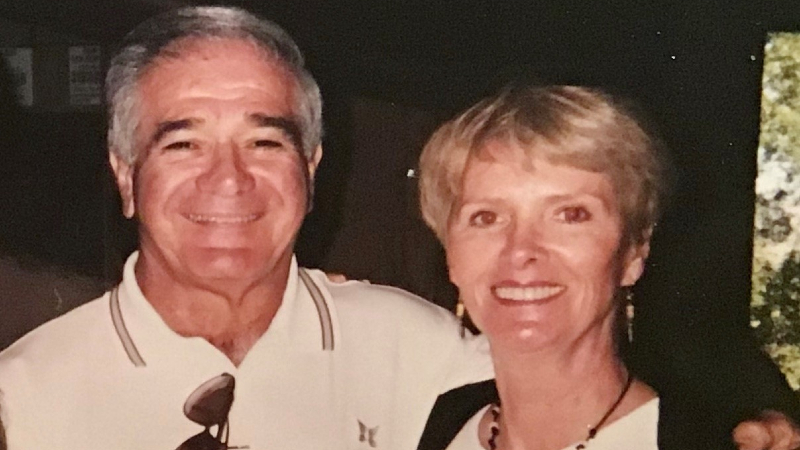
In just the eight years he played, football took an immense toll on Boghosian’s body. He had cervical neck surgery and several knee surgeries. His feet hurt constantly.
He adored Schiltz’s son, Braden. Braden was diagnosed with autism early in childhood. Boghosian’s difficulties grasping his grandson’s disability were one of the first signs of his cognitive failure. He couldn’t understand why Braden would have outbursts or not pick up golf like he wanted him to.
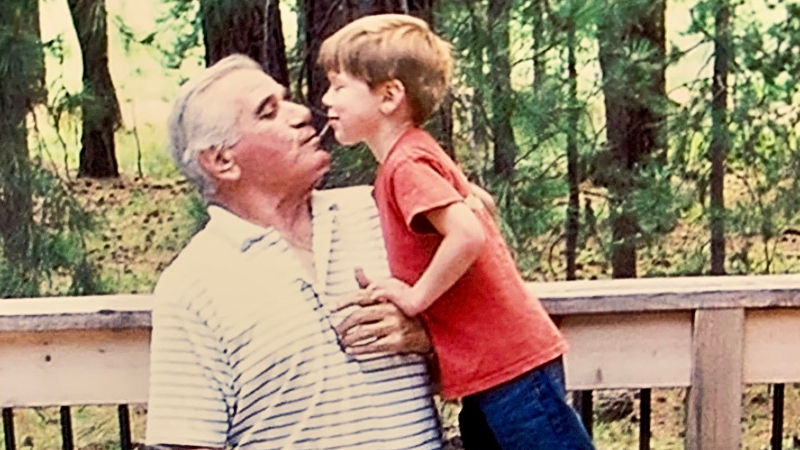
Still, Boghosian showed his grandson off to anyone who would listen. He took Braden with him golfing and to the many breakfasts he had with friends. Until Braden stopped wanting to be in a car with his grandfather.
The family saw Boghosian slip, bit-by-bit. His affect was always the same, but the frequency with which he would repeat himself increased over the last five years of his life. Even after the DMV revoked Boghosian’s driver’s license he insisted it was still in his pocket.
By late 2019, Schiltz made frequent trips to Palm Springs to help care for her father. At the time, a neurologist who saw Boghosian posed that his problems were not due to dementia but could be caused by CTE.
Schiltz and her family kept CTE in the back of their minds but hadn’t considered the idea of donating Boghosian’s brain for research until early 2020, when her husband Brian was watching the Aaron Hernandez documentary on Netflix. The film’s discussion of CTE sparked the idea of brain donation.
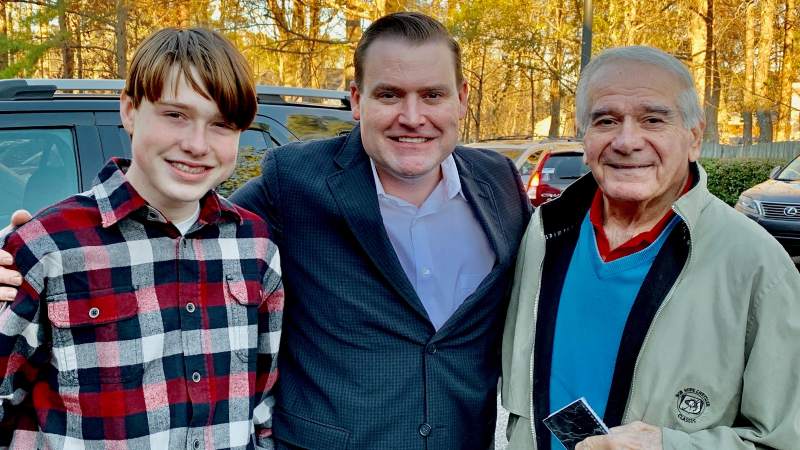
Shortly after seeing the film, Schiltz connected with Lisa McHale, CLF’s Director of Legacy Family Relations to arrange for her father’s brain to be studied after death.
“Dad would have loved that,” Schiltz said.
On February 23, 2020, he died from congestive heart failure at 88 years old. Upon his death, Schiltz received an outpouring of support from people whom he had coached or helped at some point. A former Oregon State player remembered Boghosian paying him a dollar to cut his hair as he had no time for hippies. Others remembered how he used his rolodex of business cards to help them find jobs or make connections.
As the family mourned Boghosian’s passing they learned he was diagnosed with Stage IV (of IV) CTE. Schiltz is thrilled she reached out to McHale before her father’s death.
“Now we know that’s going to help other people,” Schiltz said.
Boghosian loved football and the game took him out of his modest beginnings in Fresno. He loved sports but Schiltz believes her father would have advocated for children to play soccer before they start tackle football, preferably in high school.
Schiltz and her family live in Atlanta. Because Boghosian kept everything he ever owned, she found his UCLA uniforms, notebooks, helmets, and other treasures he kept. She sent the memorabilia to Atlanta’s College Football Hall of Fame, where it is now displayed. Recently, Braden visited the exhibit and was awed by his grandfather’s place in football history.
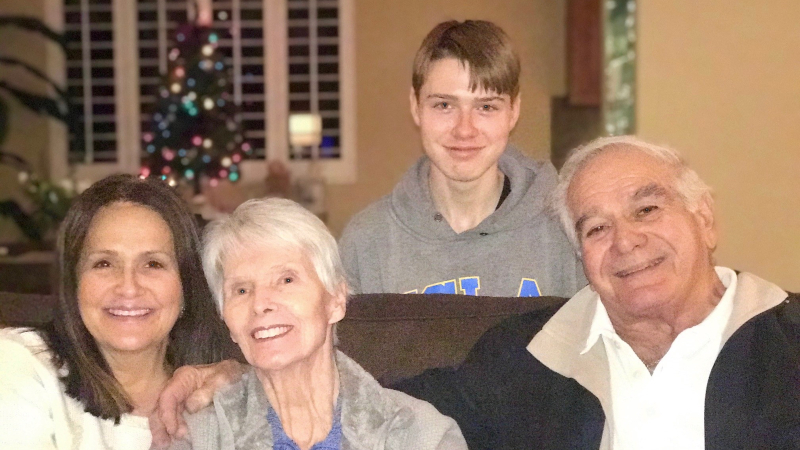
Schiltz once gave her father a book to fill out with details about his life. Its pages remained blank. She wishes she had recorded her father talking more about the early parts of his life. She would advise any child who suspects their parent may have CTE to do the same. But even if her father never got to tell her about everything he went through, she’s heard about the profound impact he made in life from plenty of others.
“No one’s ever said anything unkind to me about him,” Schiltz said.
Dorian Boose
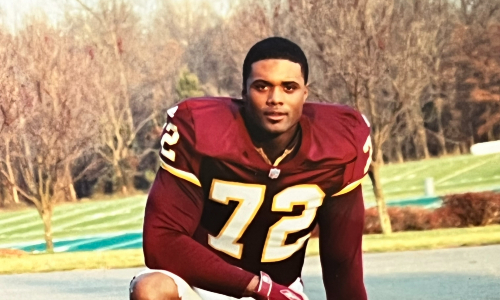
Warning: This story contains mentions of suicide and may be triggering to some readers.
Every few months, Brenda Boose receives another adoring message about her late ex-husband, former NFL player and Washington State University star Dorian Boose. They pour in from strangers, old teammates, friends, and even people who only met Dorian once. Brenda printed out a particular message she received from a young man in 2021. The note reminded her about Dorian’s generosity and the effect he had on others:
I met Dorian in the fall of 1997 when I was 16 and a junior in high school. A friend of my family was a big booster for the Cougars and he invited me to join the team for an away game at USC. Most of the players were too busy but that changed when my dad had me approach Dorian. He was incredibly friendly and took me around, introducing me to everyone. After the game, we snapped a few pictures and exchanged information.
Some point later, Dorian reached out to me and we got to chat like old buddies. I remember I had told him I loved to sing, and we even sang together on the phone. After the Rose Bowl, he sent me his practice jersey and WSU warmup suit. Though our correspondence ended as the years passed, I still remember Dorian fondly and bring up him up whenever I get the chance.
“That’s just the kind of person Dorian was,” said Brenda.
Coming together through faith
When Brenda first met Dorian in 1991, he was attending Walla Walla Community College in eastern Washington. Dorian and Brenda were members of the local church choir. In addition to sharing the same faith, she was drawn to his gregarious personality and kind heart.
“Dorian had a natural joy that drew everyone in,” said Brenda.
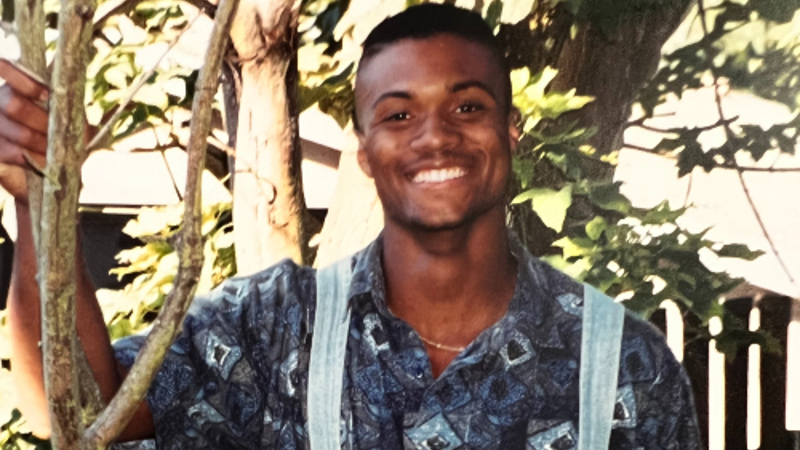
Certain talents came naturally to Dorian. He could sing very well and learned how to play piano completely by ear. Dorian was extremely athletic and at 6’6,” loved to play basketball. He picked up tackle football for the first time as a freshman at Foss High School in Tacoma, Washington. His combination of size and speed immediately turned heads and led him to Walla Walla CC and eventually to a scholarship to play defensive end for the Washington State Cougars.
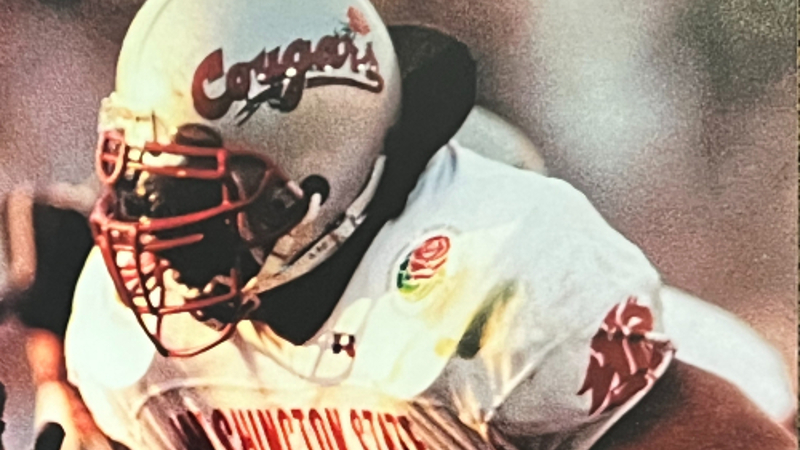
Dorian and Brenda started dating in 1992 and married in 1995 while Dorian was at WSU. Having each grown up in strict households, the couple shied away from drugs and alcohol. Brenda recalls how silly she and Dorian felt when they were served champagne during their honeymoon. Family and faith were the bedrock of their marriage.
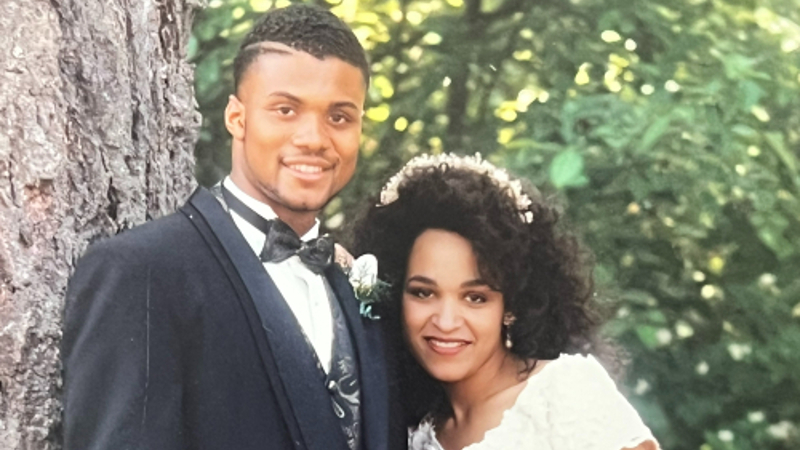
High hopes
Brenda and Dorian’s first son, Taylor, was born in 1996. Brenda remembers Taylor’s early years fondly for how much Dorian embraced being a father. Dorian loved his family immensely and could often be found horsing around and playing with Taylor.
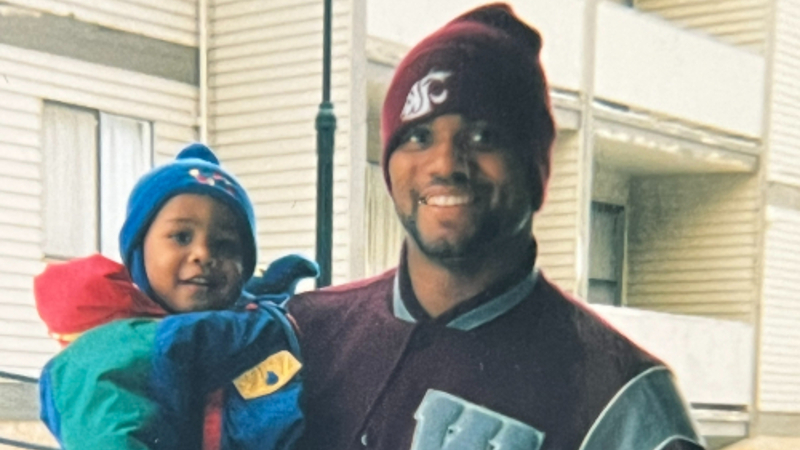
Dorian balanced fatherhood and athletics well. He played a major role in putting Washington State University’s football program on the map with the “season of destiny” in 1997. The Cougars went 10-2 and made it to their first Rose Bowl appearance in 67 years. Dorian’s teammates voted him defensive captain for his outstanding play and leadership.
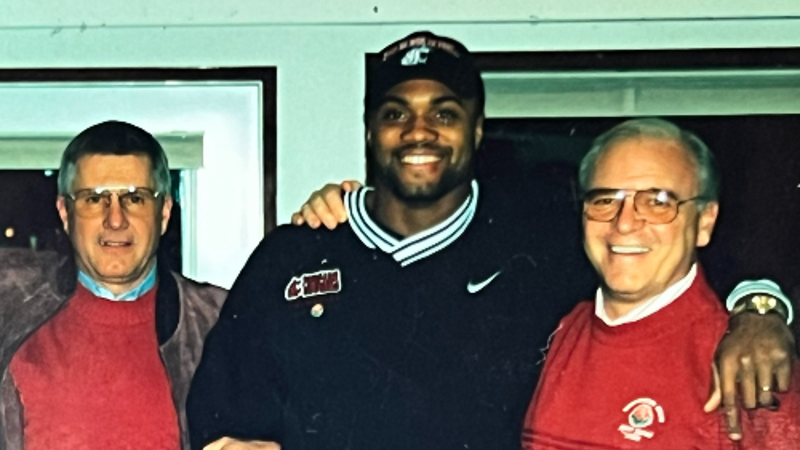
Dorian’s breakthrough in 1997 created the possibility of a bright new future. At the NFL Combine before the draft, Dorian was told he could have a 15-year football career. The New York Jets saw his potential and selected him 56th overall in the 1998 NFL Draft. An overnight star in New York, Dorian spoke for hours with everyone from then-Jets coach Bill Parcells to Regis Philbin and Kathie Lee Gifford for an appearance on Live with Regis and Kathie Lee.
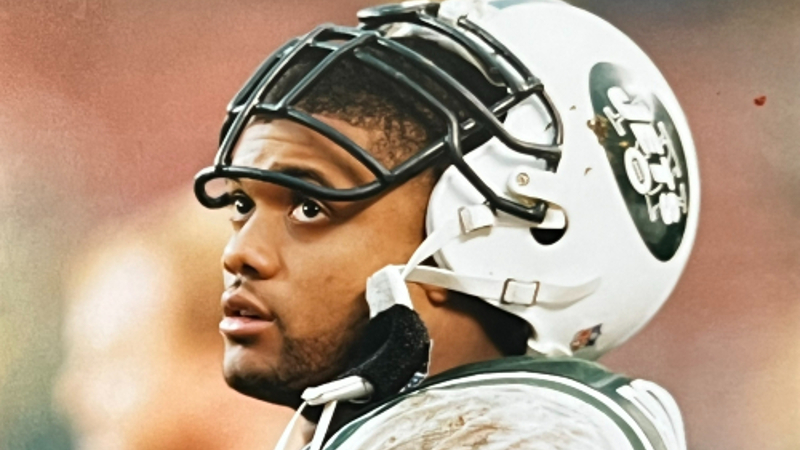
“We were extremely excited about the future and for what was ahead,” said Brenda. “We thought we would be together forever and raise our boys and live a very fulfilling life.”
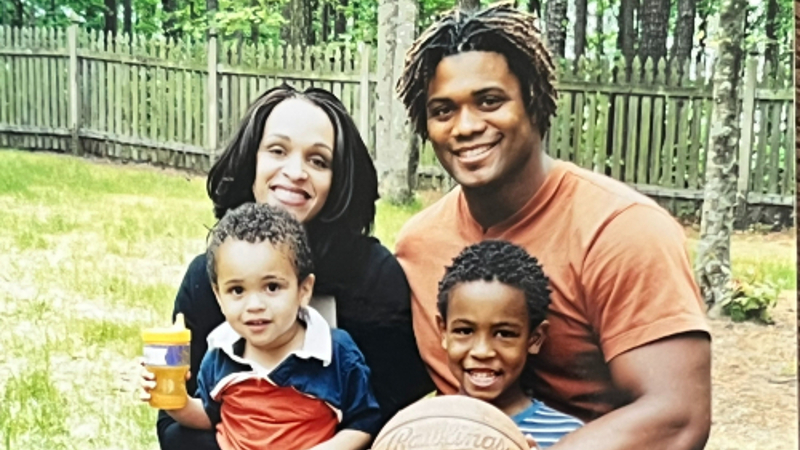
A different Dorian
Dorian’s time with the Jets didn’t live up to expectations. Injuries made it difficult for him to get consistent playing time. After two years in New York, he joined the Washington Commanders for another injury-riddled stint. Eventually, he signed with the Houston Texans but was waived again after a knee injury.
Brenda gave birth to the couple’s second son, Brady, in 2000. Within two weeks of getting cut by Houston, Brady was diagnosed with autism. For the Boose family, the already anxious stretch of Dorian’s career became even more stressful and overwhelming.
Around then, Brenda noticed a slightly different Dorian. Rather than embracing the challenge of Brady’s diagnosis, he became distant and aloof, developed a careless attitude, and was disappearing on his own for many evenings. When Brenda pressed him on what he was doing those nights, Dorian told her he had been drag racing.
“I was just shocked,” said Brenda. “It was so out of character for him, and I couldn’t make any sense of the situation.”
When he was healthy again, Dorian decided to try to rejuvenate his football career in the Canadian Football League. His career in the CFL couldn’t have started any better – he made seven sacks and won the Grey Cup his first year with Edmonton in 2003.
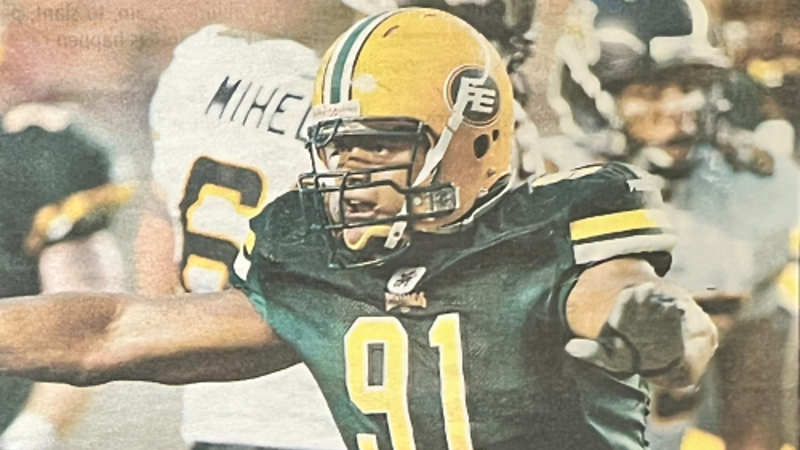
Dorian’s marriage was still strained and his residence in a different country only exacerbated the issue. When Dorian did call home, Brenda could hardly recognize the person on the other line and was heartbroken by how much he had deprioritized his family.
“It was like, ‘Who am I talking to?’” said Brenda. “The whole thing just fell apart.”
Exhausted from the uncertainty of their relationship and needing to provide stability for Taylor and Brady, Brenda made the difficult decision to file for divorce in 2003. Dorian played just one more season in the CFL in 2004 before retiring from professional football.
For the next decade, Brenda’s contact with Dorian was at best inconsistent and mostly non-existent. Brenda tried to protect the boys’ emotions as much as possible and didn’t want them to hear from Dorian if his communication was going to be scattered and incoherent. Because of the distance between them, they were mostly in the dark about where Dorian was and what he was doing.
Around 2015, Dorian’s acquaintances began messaging Brenda to tell her he needed serious help. Brenda reached out to the Royal Canadian Mounted Police and was able to connect with a detective who would investigate his whereabouts. He found Dorian and let Brenda know her ex-husband was living on the streets of Edmonton. The officer also told Brenda how well-loved Dorian was in the unhoused community. Later, Brenda learned Dorian prayed and served as encouragement for others in the community.
Despite the pain of learning that Dorian was living on the streets and the frustration and confusion of the past decade, Brenda was comforted to know his core values of faith and generosity were still on display. She passed along a message for the officer to tell Dorian to contact his parents and that God loved him. The officer relayed the messages and told Brenda they moved Dorian to tears.
In 2016, after years of distance, Taylor wanted to reach out to his dad and wish him well. With the help of Dorian’s mother, the family got in touch with Dorian, who was in a shelter getting help. Taylor and his father were able to have a conversation over the phone that spring.
A few months later, Brenda was awakened by a phone call the night of November 22. Dorian had died by suicide. He was 42 years old.
Brenda is thankful her family was able to speak with Dorian before he passed away.
“It was nothing but God that made that moment happen and we are grateful to this day,” she said.
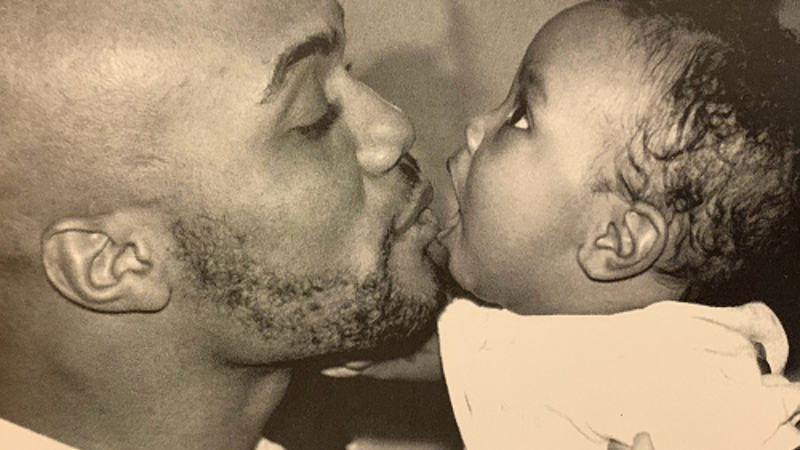
Brenda doesn’t remember Dorian ever discussing concussions while they were together, and they had separated years before CTE had ever been diagnosed in a former NFL player. But after discussions with Dorian’s former agent, Brenda decided to donate his brain to the UNITE Brain Bank. There, Dr. Ann McKee diagnosed Dorian with stage 3 (of 4) CTE. Dr. McKee told Brenda how Dorian had one of the most severe cases she had seen in someone his age.
Brenda had two reactions to the diagnosis: first relief, then grief.
The relief came when Dr. McKee suggested the severity of Dorian’s CTE could have caused his behavior to change quite early in his life. The pathology explained why Dorian’s actions and behavior were so drastically different from the man Brenda knew Dorian to be.
Then came the immense grief. Brenda struggled to eat and sleep as she thought about how much Dorian would have suffered by himself without understanding exactly why he was changing.
“The CTE took Dorian’s life,” said Brenda. “It took his future. It took his being a husband. It took his being a father. It took everything.”
Redemption
Brenda wants to share Dorian’s story to show why he struggled near the end of his life and to dispel the notion that his lack of NFL success drove him to despair.
“Dorian wasn’t bitter about his career not panning out,” said Brenda. “There was so much more to him than football. CTE caused this.”
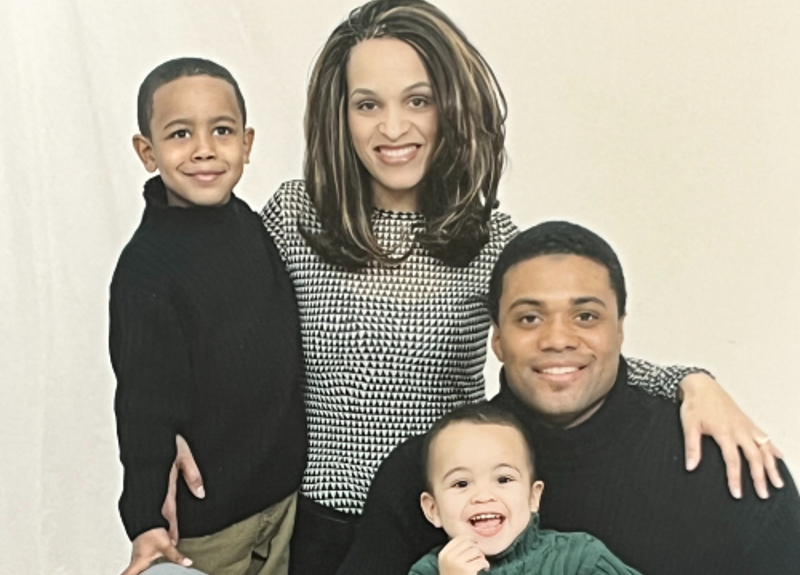
These days, Brenda still has many beautiful memories about Dorian’s time in football, but her family’s relationship with the sport has changed since the diagnosis. With the knowledge she has gained through this experience, Brenda is now a strong believer in Flag Football Under 14. Even through Dorian didn’t start tackle football until high school, she sees moving away from youth tackle football as the best way to prevent future cases of CTE. Brenda urges parents to have the conversation about flag football early on for the health and safety of their kids.
Brenda is grateful for how much more information there is about CTE than there was when she and Dorian were married. If anyone finds themselves in a situation like she was in the early 2000s, she recommends leaning in on the resources available on CLF’s website and elsewhere. For other partners of suspected CTE, she has three pieces of advice: get educated about the disease, reach out for support, and have as much compassion as you can.
Though Dorian passed away far too soon and left her life well before his death, Brenda can see how the best of Dorian lives on in her two sons. In Taylor, Brenda can see Dorian’s many talents and strengths. And in Brady, Brenda sees glimpses that remind her of the beautiful man she met in the church choir all those years ago.
“He has his father’s spirit, always with a smile on his face and a joyful presence,” said Brenda. “I just want everyone to remember that part of Dorian more than anything.”
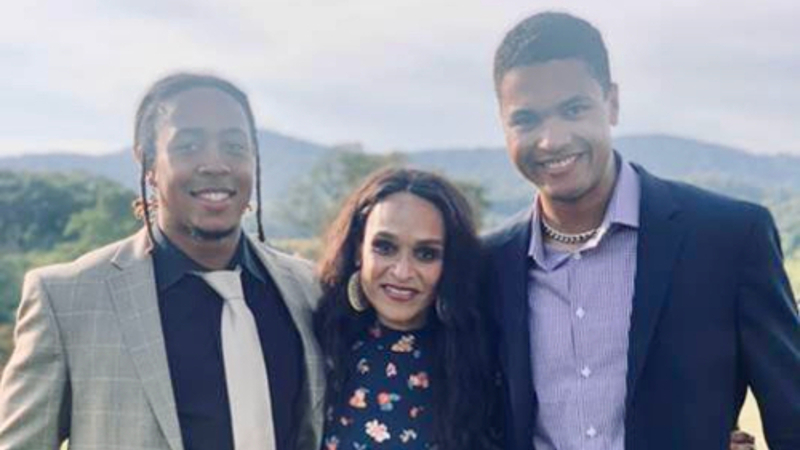
Suicide is preventable and help is available. If you are concerned that someone in your life may be suicidal, the five #BeThe1To steps are simple actions anyone can take to help someone in crisis. If you are struggling to cope and would like some emotional support, call the Suicide & Crisis Lifeline at 988 to connect with a trained counselor. It’s free, confidential, and available to everyone in the United States. You do not have to be suicidal to call. If you’re not comfortable talking on the phone, consider using the Lifeline Crisis Chat at 988lifeline.org/chat
Are you or someone you know struggling with lingering concussion symptoms? We support patients and families through the CLF HelpLine, providing personalized help to those struggling with the outcomes of brain injury. Submit your request today and a dedicated member of the Concussion Legacy Foundation team will be happy to assist you.
Daniel Brabham
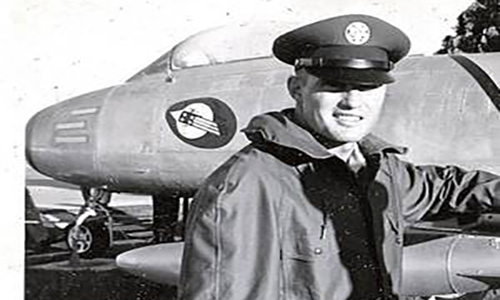
Daniel Brabham was an Air Force veteran, a teacher, a family man, an accomplished college and professional football player, and a lifelong crusader for change.
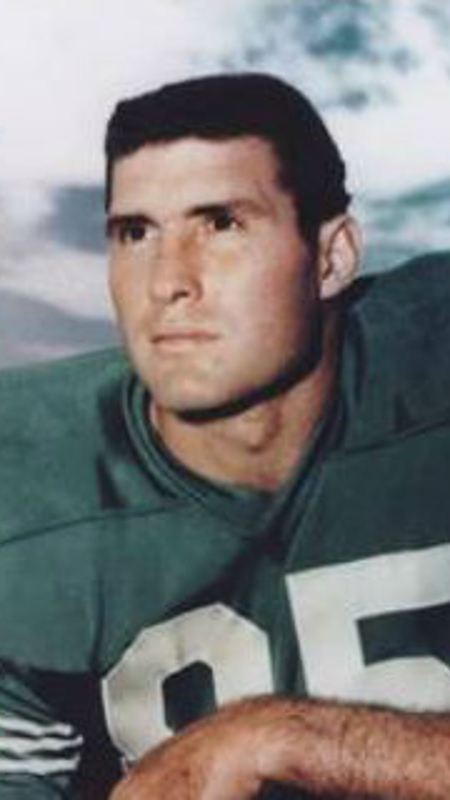
A former operator with Shell Chemical, native of Greensburg and resident of Prairieville, he passed away Sunday, January 23, 2011, in Baton Rouge, at the age of 69. He belonged to Carpenters Chapel United Methodist Church in Prairieville. He also formerly taught high school chemistry and math in Tangipahoa Parish. He was a veteran of the U.S. Air Force Reserves. He attended the University of Arkansas and LSU, receiving a bachelor’s degree in vocational agriculture and numerous academic recognitions through honor societies: Omicron Delta Phi, as well as being an Academic All-American.
He played football at college and professional levels, receiving distinction as an All-Southwest Conference recipient (1962) and as the third leading rusher in the SWC during his first year as a fullback. He was the first-round draft pick for the Houston Oilers and later traded to the Cincinnati Bengals, his career spanning from 1963-1968. He was a lifelong crusader for change, having smoking banned in his workplace in the 1980s and founding the Louisiana Fisherman’s Forum. He enjoyed genealogy (tracing his family history to Scotland and organizing reunions), handgrabbing for catfish (featured sportsman in Louisiana Conservationist and in a filmed documentary), aviation (acquired his pilot’s license), writing poetry and music, and spinning yarn surrounded by family and friends. Additionally, he was a steam locomotive and history buff, a self-taught player of the guitar and piano, and an avid reader.